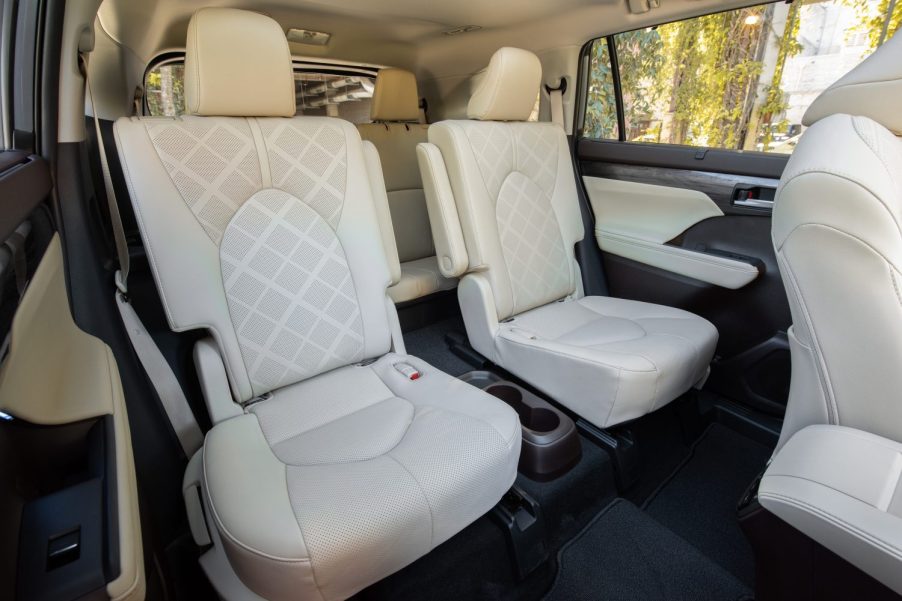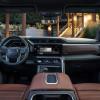
What’s the Difference Between the Toyota Highlander and Toyota Sequoia Hybrid SUV?
Toyota‘s two biggest hybrids are its Highlander crossover and the upcoming 2023 Sequoia SUV. Both these vehicles offer a 3rd row of seating and AWD/4WD. They even have similar amounts of interior space. But the similarities end there: the Highlander and Sequoia are constructed in very different ways because they are engineered for very different tasks. Here’s how they stack up:
| 2022 Toyota Highlander Crossover (Hybrid) | 2023 Toyota Sequoia SUV (Hybrid) | |
| Seating | 6-7 | 7-8 |
| Cargo Space | 84.3 cubic feet | 86.9 cubic feet |
| Gasoline Engine | 2.5-liter I4 | 3.44-liter twin-turbocharged V6 |
| Weight | 4,465 pounds | 6,030 pounds |
| Fuel Efficiency (AWD/4WD) | 20 city/28 highway mpg (23 combined) | 19 city/22 highway mpg (20 combined) |
| 0-60 MPH | 8.4 seconds | 6.0 seconds (estimated by MotorTrend) |
| Tow Rating | 3,500 pounds | 9,520 pounds |
| MSRP | $35,855 | $58,300 |
The Toyota Sequoia is a full-size, full-frame SUV

The Toyota Sequoia shares its chassis with the full-size Tundra pickup truck. This means its engine and suspension are all attached to a ladder frame by workers in Toyota’s San Antonio factory. Then the workers set either a Tundra or Sequoia body on said frame.
The Sequoia’s “full frame” construction makes it especially rigid while off-roading or towing heavy loads. Full-frame vehicles are also easier to modify with accessories such as lift kits. Finally, if a full-frame truck or SUV suffers from irreparable rust, you can complete a frame swap and continue to drive it.
Toyota has a long history of sturdy full-frame trucks and SUVs. Many of these vehicles have achieved a cult following. The Sequoia and the latest Tundra finally combine Toyota’s full-frame construction and advanced hybrid engine technology.
Read more about the Toyota Sequoia’s tow rating.
The Highlander is Toyota’s largest crossover

By the 1950s, automakers found that they could make vehicles lighter and lower by replacing the old ladder frames with a stiffened body shell called a “unibody.” This has been the most popular way to build cars for decades.
As automakers developed lighter materials and better suspension technology, they found they could build taller unibody vehicles. These “crossovers” may have the same dimensions as SUVs, but their construction has much more in common with cars. Toyota’s RAV4 is an immensely popular crossover. The Toyota Highlander doubles down on this successful technology to produce a larger vehicle with a 3rd row of seating.
Find out more about how the Highlander crossover is constructed.
Which 3rd row hybrid is best for you?

If you need eight seat belts, the Sequoia with its three-passenger 2nd row and three-passenger 3rd row is the best Toyota for you. Likewise, if you need room for passengers and gear and will also be towing a ton (or almost five tons) the Sequoia has one of the highest tow ratings in its class.
For most other uses, the Highlander has proven itself equal to the Sequoia. With its lower weight and smaller engine, it offers much better fuel mileage. It also has nearly the same cargo capacity as the Sequoia. Finally, the difference between the base price of a 2023 Sequoia ($58,300) and Highlander hybrid ($35,855) is the equivalent of the MSRP of a Toyota Corolla L.
Learn the technical differences between a crossover and an SUV or see how the Sequoia and Hybrid stack up in the video below:



